
Humour is built on cruelty. At least, the funny stuff is. I can give you two childhood examples. I had a couple of mates called Plow and Meg. Plow was a strange lad, skinny as rake with a mass of curly hair and about as likely to get a girlfriend as a piss-stained lamppost. He ate inedible health food, was rubbish at every sport and his pale, spaced-out mother might have been a witch. My older brother always referred to him as ‘Scared Stiff Plow’.
In short, he was the opposite of cool, a fact he liked to demonstrate by his preferred mode of transport. The rest of our gang had Choppers, Grifters and BMXs, but he had a turquoise, folding bike that we were convinced belonged to his supernatural mum. One day we were kicking a ball about in the road when Plow turned up on his gay bike. The ball rolled loose and he thought it would amuse everyone to ride over it.
And fuck, he was right.
His front wheel touched the ball, climbed a promising inch or two, and then skewed horribly sideways, wrenching the handlebars from his feeble grasp and sending him skidding along the road face down. Not one of us offered a word of sympathy as he limped home blubbering while pushing his spasticated clown bike.
Then there was a game of cricket over the park that we were all excited about because we’d decided we were old enough and tough enough to use a proper cricket ball rather than a tennis ball. Things were going okay until a bigger boy turned up, asked for a game and rather presumptuously went straight into bat. Plow bowled, a skill he never quite mastered given it involved some sort of hunched, weaving run up followed by a delivery that looped high into the air, bounced once and pretty much died. No one was scared of Plow’s bowling, especially this bigger kid who twatted the ball hard and low toward Meg loitering on the boundary line. Meg, perhaps distracted by the Mars Bar he was scoffing, simply stuck out a leg to stop the speeding ball, obviously forgetting that the days of using a tennis ball were over. Struck on the knobbly bit of the ankle, he was unable to do anything but hop and howl for a good minute as we collapsed with laughter.

Unfortunately, you can only laugh at other people’s misfortunes for so long. Sooner or later humiliation will come your way, too, and the best way to deal with it (apart from maybe learning a lesson or two) is to laugh at yourself. What this means is that even I, a doyen of cool, have occasionally slipped up. Take that time I was invited to a dinner party by a mate called Ed. He was a bit of a chef and planned to open a little restaurant, deciding it’d be a good idea to try out a signature dish on a few less critical patrons. And so, I went and scoffed down a tasty crab meal along with a few cold beers.
Good food, nice company.
I really should have left there and then. But no, I thought I had the hang of this social lark, leading me to happily partake in a few puffs of marijuana, a drug I was none too familiar with. Well, the world went weirdly 3D, my left leg started to shake, and I knew beyond a shadow of a doubt that I was going to hurl if I moved one inch, let alone try a sprint for the desperately needed bathroom. “Ed,” I called as the sweat began to prickle my face, “Gonna puke.” He got me a big bowl and I sat staring at it for a good fifteen minutes as my leg continued doing a latter-day impersonation of Mohammed Ali. The other guests took photos and giggled, although I’m unsure if they captured me in all my glory as I eventually vomited Ed’s signature dish back onto the table he’d not long served me at.
I haven’t been invited to a dinner party since.
Like I said, humor is built on cruelty. The best gut laughs come from witnessing someone else’s bad luck while enjoying a sense of thank fuck that’s not me. See the movies for confirmation.
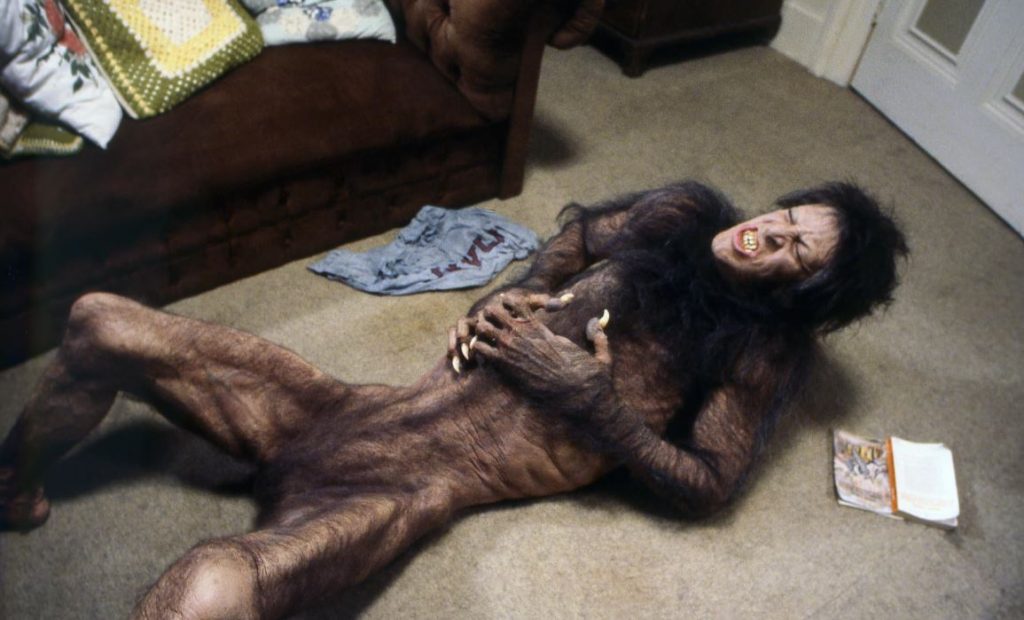
The undead cinemagoers in An American Werewolf in London (1981)
John Landis’ Werewolf is the finest horror comedy out there, its perfect splicing of the two genres captured during a whacked-out scene in a Piccadilly Circus porno theater.
Beckoned in by his wisecracking, rapidly decomposing best mate Jack (Griffin Dunne), newly minted lycanthrope David Kessler (David Naughton) can only sit at the back in a state of bewilderment after having torn apart six unlucky sods the night before. Jack, however, treats the somewhat unusual situation as if he’s a party host. “I want you to meet some people,” he tells David amid the porno flick’s corny music, cheesy acting and heavy breathing.
And so, David is introduced to the victims of his ‘carnivorous lunar activities’ that include a sullen city gent with deep claw marks across his face, a bloodied but still cheery pair of lovers, and three disdainful hobos. “Can’t say we’re pleased to meet you, Mr. Kessler,” one of the tramps says while glaring over his shoulder. The city gent, however, is even more hostile. “You’ve left my wife a widow and my children fatherless,” he says. “And, I understand, I am to walk the Earth in limbo, one of the living dead, until the wolf’s bloodline is severed and the curse lifted.” Then he points at him, his voice trembling with suppressed anger. “You must die, David Kessler!”
David apologizes, admitting he has ‘absolutely no idea of what to say’ before asking for suggestions for his next move. Suicide is Jack’s firm answer, leading to the rest gleefully piping up with a plethora of ways in which David can do himself in, including sleeping pills, electrocution and drowning. David favors hanging, but Jack gets worried he might choke to death. “So what?” one of the hobos says. “Let him choke.” “Do you mind?” an irked Jack replies. “The man’s a friend of mine.”
A solution is just around the corner, though, and given it involves ending up nude in front of the scrumptious Jenny Agutter I’d say it’s one he can be happy about.
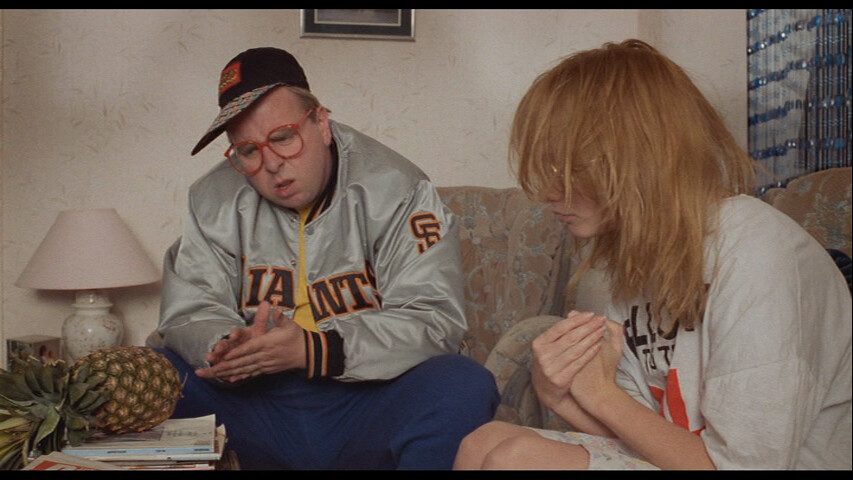
Aubrey in Life is Sweet (1990)
The moment restaurateur Aubrey announces he’s ‘mega-confident’ about the imminent opening of his business, you suspect disaster lies ahead.
Why?
Because Aubrey, who dresses like a gawky 1980s American teenager, is clearly clueless. He tries his best to be cool, but he’s accident-prone, hyperactive and a bit slimy. This is a man who neither prints menus nor advertises the first night of his Parisian-themed ‘brave new venture’ in North London. Its decor includes a gasmask and a stuffed cat’s head on the wall, plastic fish in a murky aquarium, and an onion-draped bicycle hanging in the front window. He thinks prospective diners will be tempted by kidney vol-au-vents, chilled brains, prune quiche, liver in lager and king prawn in jam.
Then again, even if they don’t order anything, he won’t be bothered because they can ‘bask in the atmosphere’ instead. At the last minute his Kiwi waitress informs him she won’t be helping launch The Regret Rien, leaving him to call in a mate’s wife, Wendy (Alison Steadman). Luckily, her lack of experience doesn’t prove a problem as no customers turn up, resulting in our ‘chef patron’ sinking into alcohol-fueled bitterness.
After a few hours of uninterrupted drinking, he begins lurching around outside his resolutely unbusy restaurant clutching a half-empty wine bottle. “Stick to your fish ‘n’ chips!” he bellows at his non-existent punters while flicking them the Vs. “Go and eat your own shit!” Wendy manages to bundle him back inside, but this doesn’t stop him from being a ‘naughty boy’ by hitting on her. “I wanna fuck you, Wendy,” he slurs, sliding down her body until he arrives at her feet. “I worship the ground you walk on.”
Somehow, he manages to get back up, but this only prompts him to spontaneously donate his suit to Wendy’s absent husband. “Leave your trousers on, Aubrey!” she warns to no avail. A minute or so later he overturned a few tables, draped a tablecloth over his head and passed out.
As played by the magnificently gauche Timothy Spall, our last sight of this harmless drunken fucker is him lying in his underpants snoring on the floor of his empty restaurant.
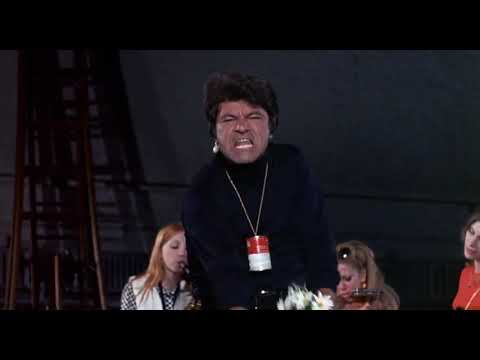
L.S.D. in The Producers (1967)
I once read about a stage version of The Diary of Anne Frank so bad that when the Nazis started searching her home a disgruntled audience member shouted: “She’s in the attic!”
Now I don’t care for the theater, and have zero idea why anyone would hand over their lovely cash to see musical nonsense like Cats, but I can empathize with the exasperated, fun-spoiling patron above. Admittedly I have little experience of watching such shows, having long been put off by the pretentious dreck already endured. For instance, I once got dragged along by a girl (Oh, the ignominies suffered for the chance of a loosened bra!) to see… well, I forget, but it was some sort of interactive set-up when you were always within touching distance of an actor.
So, there I was staring up at this guy standing on a table three feet in front of me, pretending he was on a skyscraper ledge about to jump to his doom because his parents had discovered he batted for the other side. I think he was doing a cruel world-type speech, but I had to fight every inch of my inwardly groaning self not to shove the silly, over-emoting fucker off his skyscraper-table. To this day I regret my inaction, my ardent desire to loosen my date’s bra just about winning out over the chance to cause a public spectacle while demonstrating my searing contempt for such half-arsed ‘art’.
Hence, it’s no surprise I love Mel Brooks’ The Producers, which is little more than a 90-minute piss-take of the theater. All it does is ridicule terrible playwrights, mincing directors, rotten songs and the hideous self-importance of thespians. Oh, all right, it mocks Nazism, too. Anyhow, after a casting call for Hitler is put out for the upcoming (and intentionally disastrous) Springtime for Hitler, the theater is flooded with goose stepping fuehrers, some of whom are portly, bald or dressed in only their underpants. However, they’re the wrong kind of hopeless until the confused, posy-carrying, baby-spouting hippie L.S.D. (Dick Shawn) shows up. He proceeds to sing Love Power, some piffle about how the beauty of a flower can overcome any obstacle whether it’s pollution or overdue rent. “I give a flower to the big fat cop/He takes his club and he beats me up/I give a flower to the garbage man/He stuffs my girl in the garbage can…” he trills while ridiculously prancing or tiptoeing in circles.
Now a man dancing is pretty much always funny because it seems to go against our nature (perhaps only wheeled out in the often-doomed bid to win a lady’s affection), but L.S.D.’s exaggerated mannerisms and sheer showboating are among the most absurd on film. With his thigh-length brown boots and a Campbell’s soup can hanging down his chest, it’s no surprise to see his increasingly anguished performance result in him lying on the stage sucking a finger-cymbal while holding half a banana against his ear like it’s a phone. He’s a classic example of delusion, how someone can mistake passionate, self-absorbed intensity for talent, insight or meaning. However, he’s perfect for the planned flop Springtime, leading to the triumphant, off-screen yell: “That’s our Hitler!”
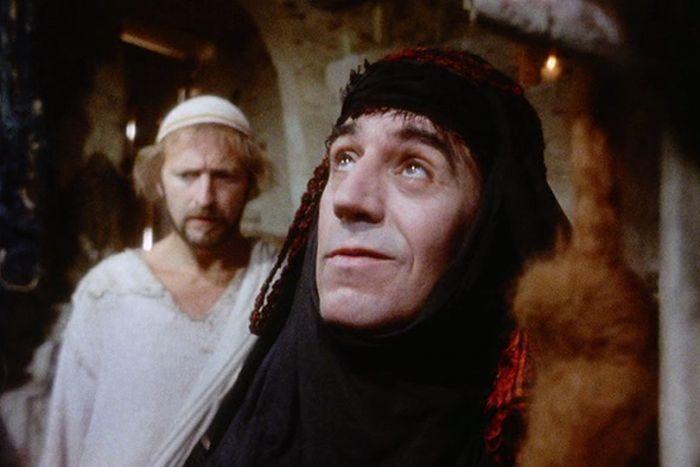
Brian’s mum in Monty Python’s Life of Brian (1979)
Brian (Graham Chapman) is not the Son of God, but he does perform one miracle in that he’s somehow turned into a nice, sensitive man despite having been brought up under the thumb of a harpy-like mother (Terry Jones). From day one she’s a distrustful, self-centered, crude woman with an awful, high-pitched voice that manages to suggest both a lack of intelligence and tenderness.
We meet her in a cowshed dozing by the side of her newborn, the father having long since scarpered. When the Three Wise Men turn up at the wrong outbuilding wishing to worship the child, she shoos them out thinking they’re drunk. “Go and praise someone else’s brat!” she shrieks, although her manner instantly changes when they reveal they have brought gifts, including gold. “Well, why didn’t you say? He’s over there. Sorry the place is a bit of a mess.” When the Wise Men realize their mistake, they take back the presents and push her over, leading her to slap her crying baby and tell him to shut up.
Poor Brian.
Twenty-five odd years later nothing’s really changed, except her teeth have got worse. She gives blowjobs to Roman soldiers, yells at Jesus to ‘speak up’ during his Sermon on the Mount, enjoys a good stoning, and hates beggars whether they’ve had leprosy or not. As for Brian, there’s little doubt he’s been harangued all his life, best shown when she catches him with a ‘Welsh tart’ in his room while a multitude of mistaken followers loiter outside. “What are all those people doing out there?” she cries in a typical machine gun-like burst of speech. “What have you been up to, my lad?” A classic piece of comedy follows when she goes to the window and looks down upon the worshipful throng as they demand to see the Messiah. “The who?” she shouts back. “There’s no Messiah in here. There’s a mess, all right, but no Messiah.”
Even when Brian unluckily ends up on a cross, she fails to show any warmth. “I might have known it would’ve ended up like this,” she mumbles pretty much to herself. “To think of all the love and affection I’ve wasted on you! Well, if that’s how you treat your poor old mother in the autumn years of her life, go ahead, be crucified!”
She then wanders off staring at the stony ground, a model of consistency when it comes to failing to have learned one blessed thing during her son’s curtailed life.
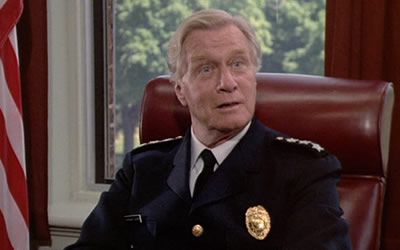
Commandant Eric Lassard in Police Academy (1984)
He may have failed to get anywhere near the same heights in Police Academy’s six dismal sequels, but Lassard (George Gaynes) is superb in the original outing. Building a wonderfully relaxed and confident comic persona from his opening line of “Johnsons…?”, it’s clear this affable, mild-mannered, high-ranking officer has been stumbling through his career for quite a while. He’s forgetful and more than a little confused, frequently displaying limited comprehension. No one takes him seriously and that includes a stray dog interrupting his welcoming speech to a bunch of new cadets by humping his lower leg.
His best moment arrives when troublesome cadet Mahoney (Steve Guttenberg) has to get rid of a skanky, gum-chewing hooker planted in his dorm. Mahoney tries to smuggle her off campus but is forced to hide her (along with himself) in a lectern that Lassard is about to utilize with a speech to some fellow officers. What follows is one of the funniest scenes in 80’s comedy, a masterpiece of timing and nuance.
“I think you’ll find the presentation interesting as well as very, very stimulating,” Lassard begins in full charm mode until he’s unzipped. Just watch how his face drops, his breezy expression not only changing to stunned disbelief, but complemented by a refusal to look down to see what the hell is going on. (Fair enough, the guy is in his sixties and probably doesn’t luck onto random blowjobs too often). With his eyes flicking left and right followed by a nervous swallow, he continues, caught between the desire to remain professional, the refusal to admit anything is wrong, and sheer naughty pleasure. However, the hooker’s oral talents make it near-impossible, resulting in his tremulous sentences often spinning out of control. Strangulated shouts, frequent moans, the possibility of tears, getting stuck on a word and inane grins all follow as he desperately tries to hang onto his dignity and remember the next part of his speech.
“Well,” he finally tells his audience after being zipped back up, “I hope this was as much fun for you as it was for me.”
Until the day I die I will always champion the first Police Academy, especially Gaynes’ standout performance among a perfect cast. This man was a gifted comic actor with a unique voice, a silly face and perfect timing. Make sure you also catch his terrific turn as an incorrigible letch in Tootsie.
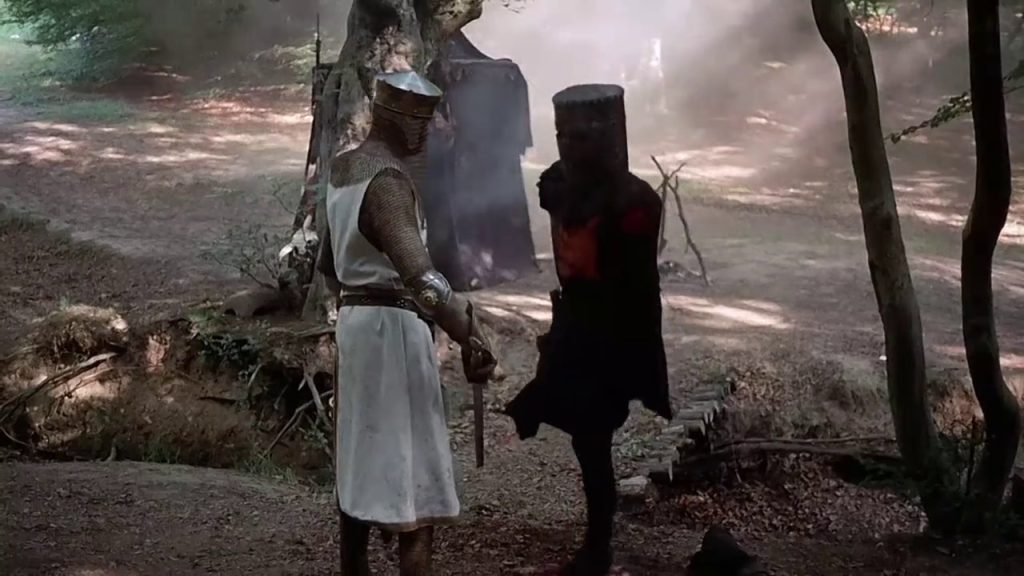
The Black Knight in Monty Python and the Holy Grail (1975)
In truth, Holy Grail is an uneven watch that’s surprisingly flat in places. It also has a poor ending, but its best bits are legendary and it remains an essential flick. Nothing exemplifies its strengths better than King Arthur and his servant coming up against John Cleese’s deranged embodiment of obstinacy. Initially Arthur watches a fierce battle during which the Black Knight dispatches a spirited opponent by shoving a broadsword through the eye slit in his helmet. He’s clearly a ferocious warrior, but despite Arthur’s tribute to his fighting prowess (“You fight with the strength of many men”) and request to join him at Camelot, he remains silent and implacable. Attempts to go around him simply result in the booming command: “None shall pass!”
An inevitable clash gets underway, seemingly finished when Arthur chops off his left arm. “Now stand aside, worthy adversary,” Arthur says with genuine commiseration as blood gushes out of the stump. The Knight, however, is strangely unbothered. “Tis but a scratch,” he counters, which would have to be one of the best lines in all of comedy. Of course, this is what Monty Python excels at: presenting a familiar setup with the utmost seriousness before ripping the piss out of its conventions. A ridiculous argument ensues in which the Knight insists he’s ‘had worse’ before they continue the fight. Another arm comes off, resulting in a triumphant Arthur declaring: “Victory is mine!”
However, this merely leads to the Knight getting even more childish, such as kicking Arthur and calling him ‘chicken.’ Reduced further to just a trunk, he becomes a bit more conciliatory (“All right, we’ll call it a draw”) but as the victorious Arthur and his servant ride off he resorts to type by bellowing after them: “Running away, eh? You yellow bastards! Come back here and take what’s coming to you!”
Is there a more concise deconstruction of macho idiocy in cinema?
Leave a Reply